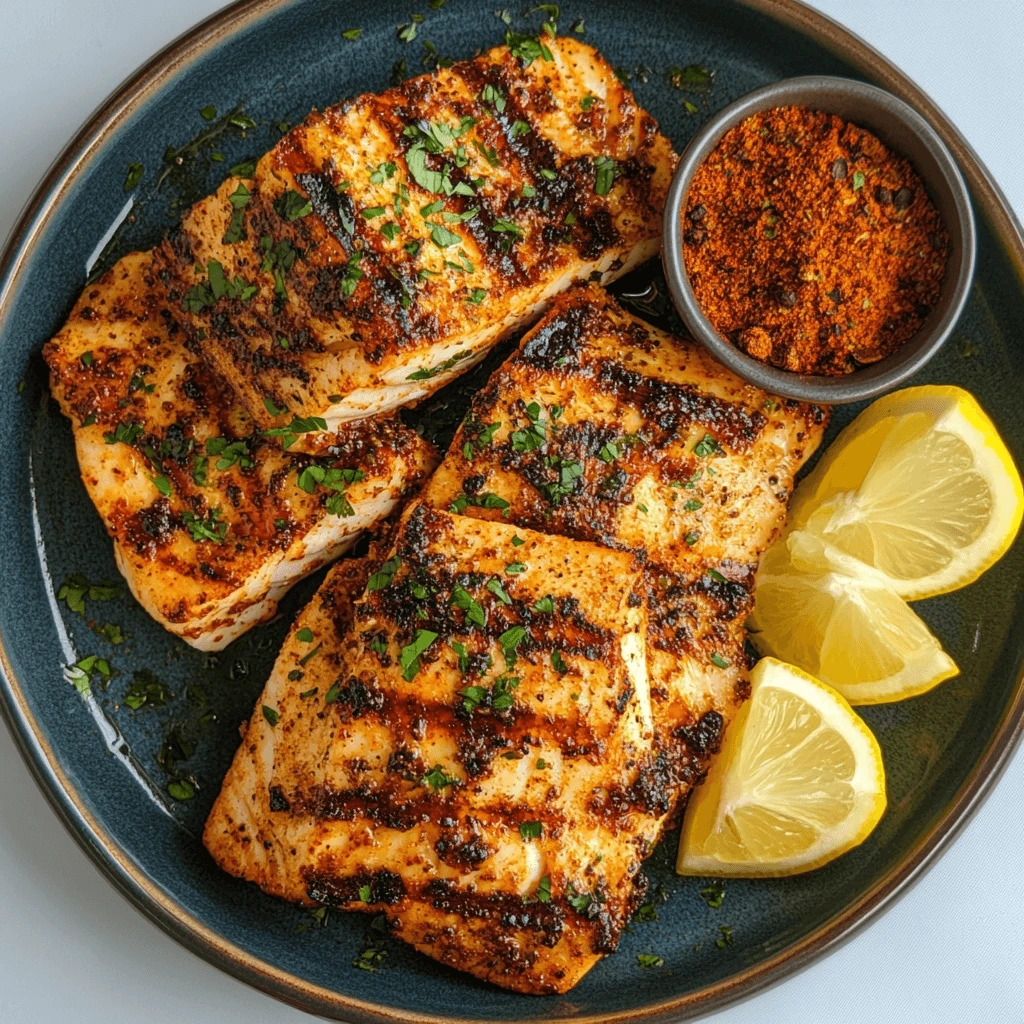Fish is a versatile and delicious choice for any meal, but let’s be honest—it’s the seasoning that takes it from good to unforgettable. Whether you’re baking, grilling, or frying, choosing the best seasoning to put on fish can make all the difference.
In this article, we’ll dive into everything you need to know about seasoning fish. From classic combinations like salt and pepper to bold blends of paprika and cayenne, we’ll guide you through the best herbs, spices, and techniques to enhance the flavor of your favorite fish dishes. We’ll also explore regional flavors, tips for applying seasoning, and how to create your own custom spice mix. So, if you’re asking, “What is the best seasoning to put on fish?”—read on to find out!
Introduction to Fish Seasoning
Why Seasoning is Essential for Fish
Fish has a naturally mild flavor, which is why seasoning is so important. Without it, your dish might feel a bit bland or one-note. A good seasoning enhances the natural flavors of fish, bringing out its sweetness and delicate texture. But it doesn’t stop there—it also adds depth and personality to your dish, whether you prefer subtle herbal notes or a punch of spice.
Think about it: the right seasoning can turn a simple fillet into a restaurant-worthy meal. It can complement the fish’s taste, highlight its freshness, and even balance out richer or fattier varieties like salmon or mackerel. Seasoning isn’t just a garnish—it’s the soul of the dish.
How Seasoning Brings Out the Natural Flavor of Fish
Seasoning works its magic by interacting with the fish’s moisture and proteins. Salt, for example, isn’t just there for taste—it helps draw out moisture, creating a firmer texture and amplifying flavor. Meanwhile, spices like paprika and garlic powder add complexity, while herbs like dill and parsley bring brightness.
When paired correctly, seasonings enhance the fish rather than overpower it. A sprinkle of lemon pepper can make white fish like cod sing, while a pinch of cayenne can balance out the richness of fried fish. The key is finding the right mix for your dish—and that’s what we’re here to help you with!
Types of Fish Seasoning
Classic Seasonings: Salt, Pepper, and Lemon
When it comes to seasoning fish, you can’t go wrong with the classics. A simple mix of salt, pepper, and a squeeze of fresh lemon is a time-tested way to bring out the best in your fish. Salt enhances the natural flavor, while pepper adds a hint of spice. Lemon, with its zesty brightness, cuts through the richness and keeps the dish light and refreshing.
So, what is the best seasoning to put on fish for a quick and easy meal? This classic trio is a fantastic option for any type of fish, from mild tilapia to rich salmon. It’s versatile, straightforward, and perfect for those new to seasoning fish.
Herbs for Fish: Dill, Parsley, and Thyme
Herbs are another excellent way to season fish, especially if you want to add a touch of freshness. Dill is a natural pairing with seafood, offering a mild, slightly sweet flavor. Parsley brings a clean, grassy note, while thyme adds warmth and earthiness.
These herbs work beautifully in baked or grilled fish dishes. For a quick herb rub, chop some fresh parsley and thyme, mix with olive oil, and coat the fillets. Pairing herbs with other seasonings like lemon or garlic creates a balanced, flavorful dish that’s sure to impress.
How to Season Fish for Different Cooking Methods

Seasoning for Baking or Roasting Fish
Baking or roasting fish allows the seasonings to fully infuse the fillets while they cook. To maximize flavor, start with a base of salt and pepper, then layer on additional spices like paprika or garlic powder. Herbs like parsley or thyme also pair well in this cooking method.
For baked fish, marinating the fillets beforehand can be a game-changer. A mixture of olive oil, lemon juice, and your preferred seasoning blend helps the flavors seep in, ensuring every bite is delicious. So if you’re still wondering, “What is the best seasoning to put on fish?”—this method guarantees rich, even flavor.
Perfect Seasonings for Grilling Fish
Grilling fish adds a smoky touch that pairs beautifully with bold spices. Cajun seasoning, a mix of paprika, cayenne, garlic, and herbs, is perfect for this cooking method. A sprinkle of lemon pepper also works wonders, enhancing the fish’s natural flavor while complementing the grill’s charred notes.
Before grilling, lightly coat your fillets in olive oil and your chosen seasoning blend. This not only locks in flavor but also prevents the fish from sticking to the grill. Whether you’re grilling cod, salmon, or even shrimp, the right seasoning can take your dish to the next level.
Regional Variations in Fish Seasoning
Mediterranean Herb Blends for Fish
The Mediterranean region is known for its fresh, light flavors, which pair beautifully with fish. Popular seasonings in this style include oregano, basil, and a touch of lemon zest. These herbs create a vibrant and aromatic profile that complements white fish varieties like cod and tilapia.
For an authentic twist, try combining olive oil with minced garlic, fresh parsley, and a squeeze of lemon. Drizzle this blend over your fish before grilling or baking for a flavor-packed dish. If you’re curious about other creative seasoning ideas, you might enjoy exploring Hillbilly Fish Fry Seasonings Recipe, which showcases unique regional spices.
Cajun and Creole Seasonings
If bold, spicy flavors are more your style, Cajun and Creole seasonings are must-tries. These blends typically feature paprika, cayenne, garlic powder, and dried herbs like thyme and oregano. The result is a smoky, slightly spicy mix that works wonders on grilled or pan-fried fish.
Rub your fish fillets with olive oil, then generously coat them with the Cajun spice blend. Whether you’re making catfish or shrimp, this seasoning will deliver a zesty kick that’s perfect for those who love bold flavors.
How to Make Your Own Fish Seasoning Blend
A Basic DIY Fish Seasoning Recipe
Crafting your own fish seasoning is simple and allows you to tailor flavors to your liking. Here’s a basic recipe to get you started:
- 1 tablespoon salt
- 1 teaspoon black pepper
- 1 teaspoon sweet paprika
- 1/2 teaspoon garlic powder
- 1/2 teaspoon onion powder
Mix these spices in a small bowl, and voilà—you have a versatile seasoning blend! This mix works for baking, frying, or grilling, and it’s a great starting point to experiment with other flavors.
Customizing Seasoning Blends to Match Your Taste
Once you’ve nailed the basics, it’s time to get creative. Add dill or parsley for a herbal twist, or sprinkle in cayenne if you like a little heat. You can also incorporate lemon zest or turmeric for a fresh or earthy undertone.
Homemade blends are perfect if you’re still figuring out what is the best seasoning to put on fish. They allow you to adjust flavors to suit specific fish types, ensuring every dish tastes exactly how you want.
Tips for Applying Seasoning to Fish

Dry Rubbing vs. Marination
When it comes to seasoning fish, the method you use matters just as much as the spices themselves. Two popular techniques are dry rubbing and marination, and each has its perks.
A dry rub involves sprinkling your seasoning mix directly onto the fish. This works well for grilling or frying, as it creates a flavorful crust when cooked. To do this, pat your fish fillets dry, apply the seasoning evenly, and gently press it into the surface. This technique is perfect if you’re in a rush and wondering, “What is the best seasoning to put on fish for a quick meal?”
Marination, on the other hand, involves soaking the fish in a liquid mix of spices, herbs, and oil. This allows the flavors to deeply penetrate the fillets. Combine olive oil, lemon juice, garlic, and your favorite seasoning blend for a marinade that works beautifully with baked or roasted fish.
How to Evenly Coat Fish with Seasoning
Uneven seasoning can lead to inconsistent flavors, so proper coating is key. Start by ensuring the fish is dry—this helps the seasoning stick better. If you’re using a rub, spread the spices across the fillets evenly, making sure to cover all sides. For marinades, place the fish in a resealable bag or shallow dish and let it soak for at least 15 minutes.
To avoid overpowering the natural flavor of the fish, use a light hand with stronger spices like cayenne or turmeric. The goal is to enhance, not mask, the fish’s taste.
FAQs About Fish Seasoning
What is the Best Seasoning to Put on Fish for Beginners?
For those just starting out, keeping it simple is often the best approach. A mix of salt, pepper, and lemon juice is foolproof and enhances the fish’s natural flavor without overwhelming it. This trio works on almost any type of fish and is a great entry point if you’re new to seasoning.
Can I Use Store-Bought Seasoning Blends?
Yes, store-bought blends can be a convenient and flavorful option. Popular choices like Old Bay or Cajun seasoningoffer a balanced mix of spices that work well on various fish types. If you’re short on time, these ready-made blends are a great way to experiment and find out what is the best seasoning to put on fish for your taste.
How Do I Make Seasoned Fish Gluten-Free?
Making gluten-free seasoned fish is easier than you might think. Instead of using flour-based coatings, opt for alternatives like cornmeal, rice flour, or even crushed gluten-free crackers. These options provide the same crispy texture without the gluten. Pair these coatings with your favorite spice blend to create a dish that’s both flavorful and allergen-friendly.
for more FAQ read this What is the best fish fry seasoning?.
Conclusion: Finding the Best Seasoning for Fish
Experimenting to Find Your Perfect Blend
Finding what is the best seasoning to put on fish often comes down to experimenting with flavors and techniques. Everyone’s taste buds are different, so don’t be afraid to try new combinations of spices, herbs, and marinades. Start simple with a classic trio of salt, pepper, and lemon or explore bold flavors like Cajun seasoning or paprika.
Each cooking method, whether grilling, baking, or frying, works best with specific types of seasonings. Experimenting with these pairings will not only help you create delicious meals but also refine your culinary skills.
Pairing Seasoning with Your Favorite Cooking Method
The right seasoning should always complement your cooking style. A smoky grilled fish benefits from bold spices like cayenne or smoked paprika. Meanwhile, baked fish works beautifully with lighter flavors like dill and parsley.
At the end of the day, the perfect seasoning reflects your personal taste and the type of fish you’re cooking. By following the tips and recipes in this guide, you’ll have all the tools you need to make fish dishes that are flavorful, versatile, and unforgettable.

